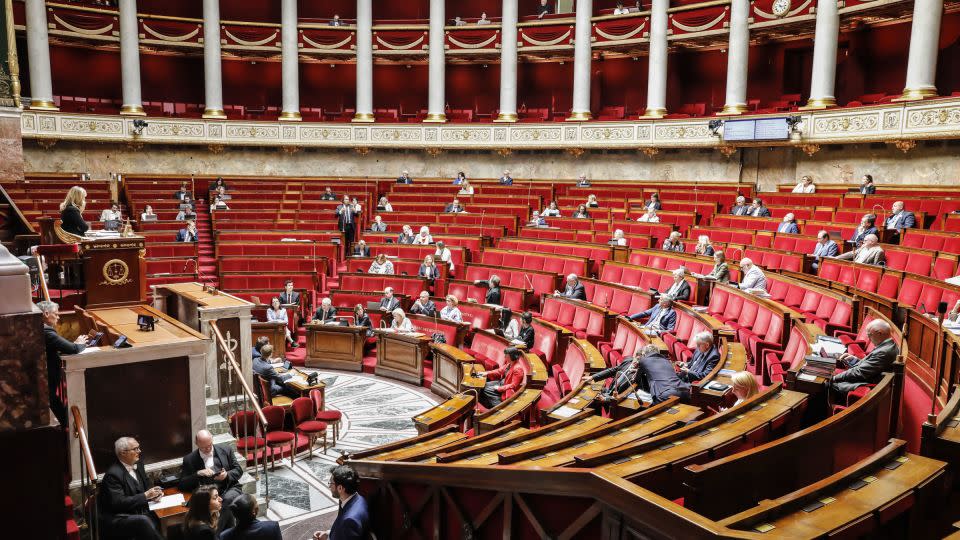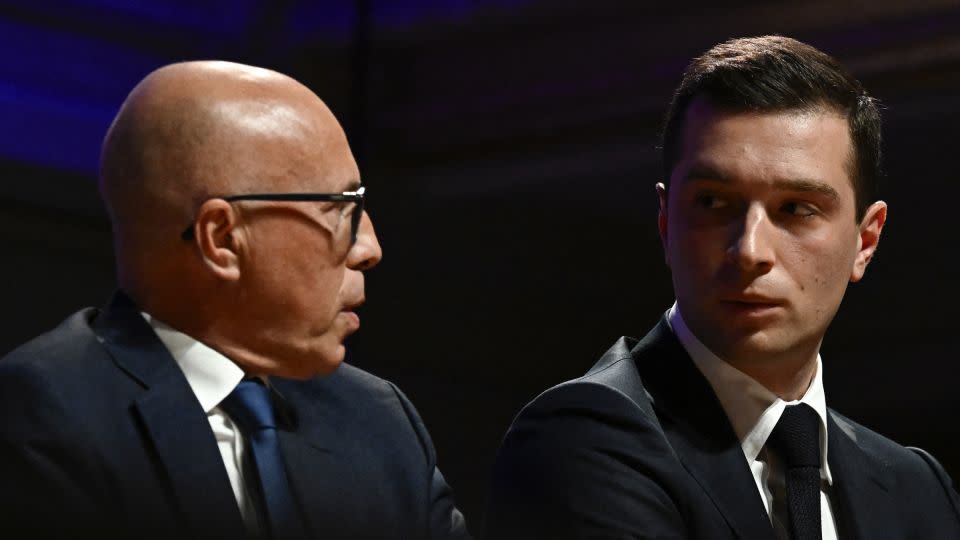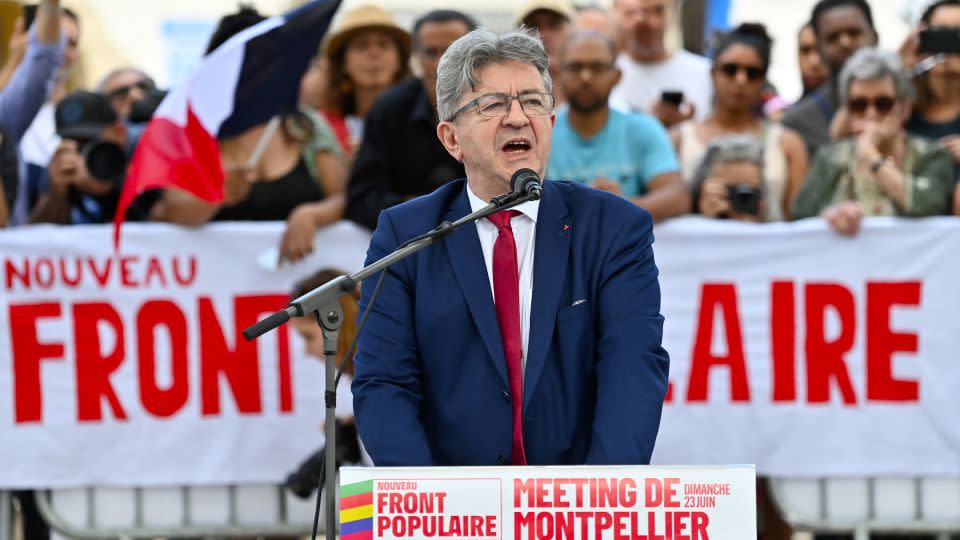France is set for its most consequential election in decades. Here’s what you need to know
France’s snap parliamentary election is one of the most momentous in decades, for both the country and the rest of Europe. Within two weeks, France could have a hard-left or hard-right government – or descend into political deadlock if no bloc wins a majority, leaving Paris hamstrung as problems mount at home and abroad.
The election will take place over two rounds on June 30 and July 7. How will it work, who are the key players and what is at stake?
How did we get here?
Minutes after it was announced that his Renaissance party had been trounced in the European Parliament elections, President Emmanuel Macron called a snap national election – becoming the first president to do so since 1997. Renaissance had come a distant second, with less than half the votes won by the far-right National Rally (RN), the party of Marine Le Pen – and only marginally ahead of the left-wing coalition in third.
Macron is not afraid of bold decisions. The first time he ran for elected office, under a party he had created only the year before, he became president. But even by his standards, this is a huge risk.
“If his bet pays off, he’ll go down as a brilliant strategist,” Kevin Arceneaux, a political scientist at Sciences Po university in Paris, told CNN. “If not, I think he will go down in history as somebody who essentially exploded the traditional party system in France, and… took a grenade to the institutions of the Fifth Republic.”
Why did Macron call an election?
Macron’s decision took even his closest allies by surprise. France’s next elections were not scheduled until 2027. Politicians rarely call an election when their party trails in the polls and there is no need to do so.
Analysts have parsed his potential motives. Although Macron was elected to a second presidential term in 2022, his party failed to win an outright parliamentary majority. To pass controversial bills like his pension reform, Macron has increasingly had to bypass parliament and resort to presidential decree, to the outrage of opposition parties and much of the public.
One theory about why Macron called an election now is that France might soon have been forced to the polls anyway. Every time Macron passes a law by presidential decree, under Article 49.3 of the French constitution, the parliament can hold a vote of confidence in his government. With more spending bills slated for later this year, Macron’s government may not have survived another of these. Perhaps he judged it is better to jump than be pushed.
Another theory is that Macron is gambling that he can defeat extremist parties by exposing them to government. With Le Pen seeming increasingly likely to succeed him as president in 2027 – when Macron will be unable to stand for a third term – this election may force her party to take up responsibility beforehand. Out of office, both the hard left and hard right have been able to rail against his policies and make outlandish promises of their own. Once in office, they will run into constraints and may find themselves unable to deliver on their promises – or simply risk being proved incompetent. Relinquishing some power now may give Macron’s platform a better chance of retaining it in 2027.

How does the election work?
France’s National Assembly has 577 seats, one for each of its electoral districts. For an absolute majority a party needs 289. In the outgoing government, Macron’s alliance had only 250 seats, and so needed support from other parties to pass laws.
If a candidate wins a majority of votes in the first ballot on a 25% turnout, they win the seat. But most elections go to a second round the following Sunday. Only those who won more than 12.5% of the votes of registered voters are allowed to stand in the second round, meaning it is often fought between two candidates, but sometimes three or four. At this stage, some candidates may drop out to give allies a better chance of victory.
What are the roles of the parliament and president?
The National Assembly is responsible for passing domestic laws – from pensions and taxation to immigration and education – while the president determines the country’s foreign, Europe and defense policy.
When the president and majority in parliament belong to the same party, things run well. When they don’t, the government can grind to a halt. With Macron’s party trailing in the polls and three years left on his presidential term, he may have to appoint a prime minister from an opposition party – in an arrangement known as “cohabitation.” Nonetheless, Macron has pledged to see out the remainder of his presidential term.
Other government ministers are appointed by the president on the prime minister’s advice. While Macron would in theory be free to nominate whomever he pleases, in practice he would be compelled to nominate ministers that reflect the will of the majority of the National Assembly.

Who are the key players?
In January, Gabriel Attal – Macron’s protege – became the youngest prime minister in French history, at the age of 34. Just seven months later, his record could be broken by Jordan Bardella, the 28-year-old leader of the RN.
Bardella was handpicked by Le Pen to head the party in 2022, ending a 50-year-rule by the Le Pen family and continuing to detoxify the party from its antisemitic and jackbooted past. Bardella grew up as an only child in social housing in Seine-Saint-Denis, a working-class suburb in Paris. He joined the RN when he was 16 and briefly attended the prestigious Sorbonne university, before dropping out to climb the party ranks. If appointed, he will become Europe’s youngest prime minister in more than two centuries.
Bardella’s campaign was bolstered after Eric Ciotti, leader of the mainstream conservative party, the Republicans, said they would enter coalition with the RN. His announcement drew fury from his blindsided party, which has attempted to oust him – so far unsuccessfully. Ciotti’s endorsement may represent the death knell of France’s “cordon sanitaire” – the principle by which mainstream parties refuse to cooperate with the radical extremes.

On the left, four days after Macron called the election, a cluster of parties banded together to form the New Popular Front – a coalition meant to resurrect the original Popular Front that blocked fascists from gaining power in 1936. The capacious – and potentially fractious – alliance comprises three-time presidential candidate Jean-Luc Mélenchon, leader of the France Unbowed party; the Socialists; the Communists; the Ecologists; and Place Publique, headed by the popular member of the European Parliament (MEP) Raphaël Glucksmann.
It is not clear who the bloc would nominate as prime minister, nor how lasting the coalition might prove to be. But it could deliver a blow to Macron’s Renaissance. Rather than several left-wing candidates appearing on the ballot, fragmenting the left-wing vote, there will now only be one in most constituencies, making it easier for the candidate to progress to the second round.

What problems might an incoming government face?
Since Macron called the election, the financial markets have taken fright – first at the prospect of an extremist government, then at the economic policies of the left and right. Earlier this month, the risk premium investors demand to hold French government debt reached its highest since 2022.
France is running one of the highest deficits in the Eurozone and now risks falling foul of the European Commission’s new fiscal rules, which had been suspended to help countries recover from the Covid-19 pandemic and energy crisis. French government spending could soon be brutally constrained by Brussels, despite the lavish promises of the RN and New Popular Front.
“The debate on the left and the right is not about fiscal consolidation, it’s about the degree of fiscal expansion they want to implement,” Mujtaba Rahman, the managing director for Europe at political risk consultancy the Eurasia Group, told CNN. “No one is talking about austerity.”
Although Bardella has recently tempered some of the RN’s spending plans, Rahman warned there could be a “major confrontation” between Brussels and an incoming French government.
While these spending constraints might prevent an incoming far-right government from making good on its electoral promises, this may harm rather than help Macron.
“It’s not clear that if there’s chaos, it necessarily arrests the momentum of the far right. It may also hurt Macron. The electorate may conclude that ultimately the far right wasn’t able to implement their program because Macron was a constraint – and that the way to get over the chaos is to ultimately give the far right a majority in 2027,” said Rahman.
“I think everyone’s going to end up with blood on their hands – not just the far right, but probably Macron as well.”

What might the outcome be?
The two-round voting system makes predictions difficult. If the RN reaches the second round in lots of constituencies, people may vote tactically to keep the party out. But their lead in the polls suggests they are on track to improve significantly on the 88 seats they had in the outgoing parliament – even if they fall short of an absolute majority.
The most likely scenario is a hung parliament, with a relative majority for the RN. But Bardella has said his party will only form a government if it wins an absolute majority. Macron might then have to search for a prime minister on the hard left, or somewhere else entirely. France might have to opt for a “technocratic” government – but these tend to fan the flames of populism rather than extinguish them.
Whatever the composition of the next Assembly, France’s next three years are likely to be marked by instability, as parties try to keep their hands clean ahead of the key presidential - and potentially parliamentary - elections in 2027.
“One possibility is that in anticipation of those elections, all the parties in the parliament will see reasons to block each other,” said Arceneaux. “If we arrive in that situation, we’re just going to have a paralyzed government that’s unable to do anything.”
This will likely raise constitutional questions, as domestic and foreign policy questions clash. Bardella has ruled out sending troops to Ukraine – an idea floated by Macron – and said he would not allow Kyiv to use French military equipment to strike targets inside Russia. In that situation, whose will would prevail – Bardella’s or Macron’s?
“This is a perfect example of what we don’t know,” said Arceneaux. “Macron could say, ‘As President of France, foreign affairs are my responsibility… so I’m not going to enforce that.’ But then you have a problem, right? You have a constitutional crisis.”
CNN’s Saskya Vandoorne, Joseph Ataman, Xiaofei Xu and Pierre Bairin contributed reporting.
For more CNN news and newsletters create an account at CNN.com


